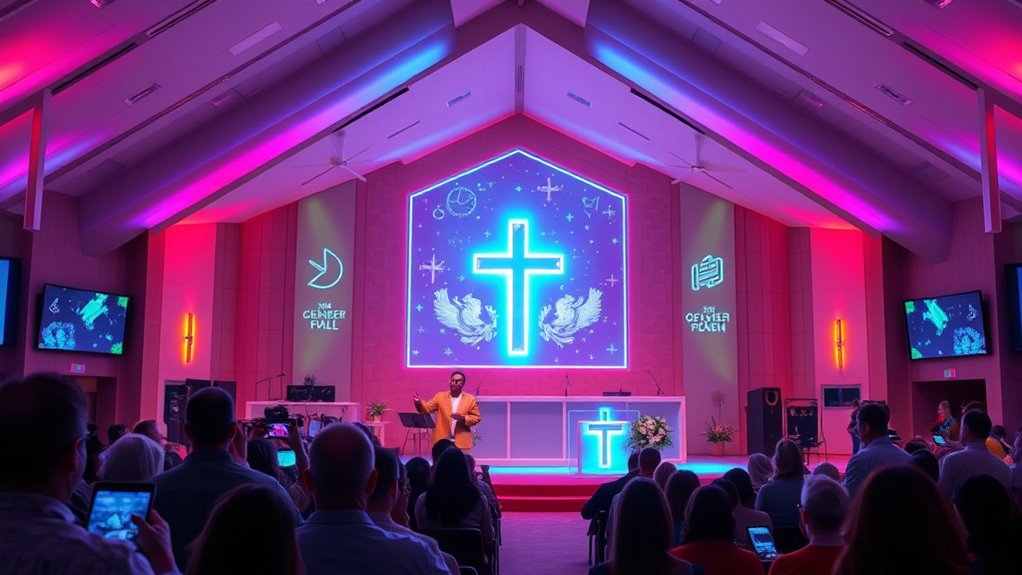AI and technology play a crucial role in modern church ministry by expanding your outreach beyond physical walls through live streams, social media, and virtual prayer groups. They help you connect with diverse communities, including those who are homebound or distant. Digital tools streamline resource management, donations, and volunteer coordination, while AI-driven strategies enhance communication with chatbots and social media insights. If you want to uncover how these innovations can transform your ministry further, there’s much more to explore.
Key Takeaways
- AI and technology expand outreach through live streaming, social media, and virtual events, reaching broader and remote audiences.
- Digital tools streamline resource management, donations, and communication, enhancing operational efficiency and transparency.
- Virtual platforms enable online prayer groups, counseling, and community building beyond physical church boundaries.
- AI-driven analytics inform content creation and engagement strategies, tailoring messages to community needs in real time.
- Chatbots and automated responses improve responsiveness, providing 24/7 support and fostering personalized spiritual interactions.

Artificial intelligence and modern technology are transforming church ministry in ways that make reaching and engaging congregations more effective than ever. As a leader in your church, you now have powerful tools at your fingertips to expand your outreach and deepen spiritual connections. Virtual outreach, for example, allows you to connect with people beyond the physical walls of your church. Through live streaming services, social media platforms, and online prayer groups, you can extend your ministry to those who may never step inside a building. This accessibility means you can reach a broader audience, including those who are homebound, traveling, or living in remote areas. You can tailor your messages to resonate with diverse demographics, fostering a sense of community that transcends geographic barriers. Additionally, implementing digital tools such as online prayer requests or virtual counseling can further personalize and enhance your ministry experience.
At the same time, digital stewardship becomes an essential part of your church’s growth. Technology helps you manage resources more effectively, from donations and memberships to volunteer coordination. With digital tools, you can track giving patterns, send automated reminders, and simplify the donation process, making it easier for your congregation to support your ministry financially. These systems also provide insights into engagement levels, helping you identify areas where you can improve or expand your outreach efforts. Using data responsibly and transparently builds trust and encourages more active participation.
Furthermore, AI-driven platforms can enhance your communication strategies. Chatbots, for example, can answer common questions from visitors or members around the clock, freeing up staff and volunteers for more personalized interactions. AI can also analyze social media trends, giving you insight into what topics or issues resonate most with your community, enabling you to craft relevant content that encourages participation. This real-time feedback loop allows your ministry to stay agile and responsive to the needs of your congregation and community.
Frequently Asked Questions
How Can AI Personalize Spiritual Experiences Effectively?
You can personalize faith by using spiritual algorithms that analyze individual preferences, struggles, and spiritual growth patterns. These algorithms suggest tailored devotional content, prayer prompts, and scripture passages, making spiritual experiences more relevant and meaningful. By embracing AI tools, you help congregation members connect deeply with their faith journey, fostering a sense of personalized faith that nurtures their spiritual development effectively and thoughtfully.
What Are the Ethical Concerns of Using AI in Church Settings?
You might worry about AI in church settings, but ethical concerns like data privacy and algorithm bias are real. You need to guarantee sensitive information stays protected and that your AI systems don’t favor certain groups or beliefs. By actively addressing these issues, you maintain trust and integrity. It’s essential to regularly review your AI tools, prioritize transparency, and involve diverse voices to keep your ministry inclusive and ethical.
How Does Technology Impact Traditional Worship Practices?
Technology transforms traditional worship by enabling virtual hymnody, allowing you to access hymns online or through apps, enhancing the worship experience. It also boosts congregation engagement by providing interactive prayer screens, live streaming services, and digital songbooks. This integration helps you connect more deeply, especially those unable to attend in person. Embracing these tools enriches worship, making it more accessible, participatory, and relevant in today’s digital age.
Can AI Replace Human Pastoral Care and Counseling?
AI can’t fully replace human pastoral care and counseling because robotic empathy lacks genuine compassion. Faith-based algorithms can assist with guidance and resources, but they don’t understand the nuance of personal struggles or emotional depth. You need human connection, empathy, and spiritual insight that only a pastor or counselor can provide. AI can support, but it can’t replicate the authentic, heartfelt care that defines pastoral ministry.
What Training Is Needed for Church Staff to Implement New Technologies?
You need to provide thorough volunteer training that covers technical skills like using new software and hardware. Guarantee staff understand how to operate digital tools, troubleshoot issues, and maintain security. Incorporate ongoing education to keep everyone updated on new features or platforms. By empowering your team with the right technical skills and training, you’ll smoothly implement technology and enhance your ministry’s outreach and effectiveness.
Conclusion
As you embrace AI and technology in your church ministry, you might wonder if these tools truly deepen connections or just modernize routines. The truth is, when used thoughtfully, they can foster genuine community, enhance outreach, and support spiritual growth. Imagine a future where technology bridges gaps, making faith more accessible and personal. By integrating these innovations wisely, you can create a more inclusive, vibrant church that meets people where they are today.










